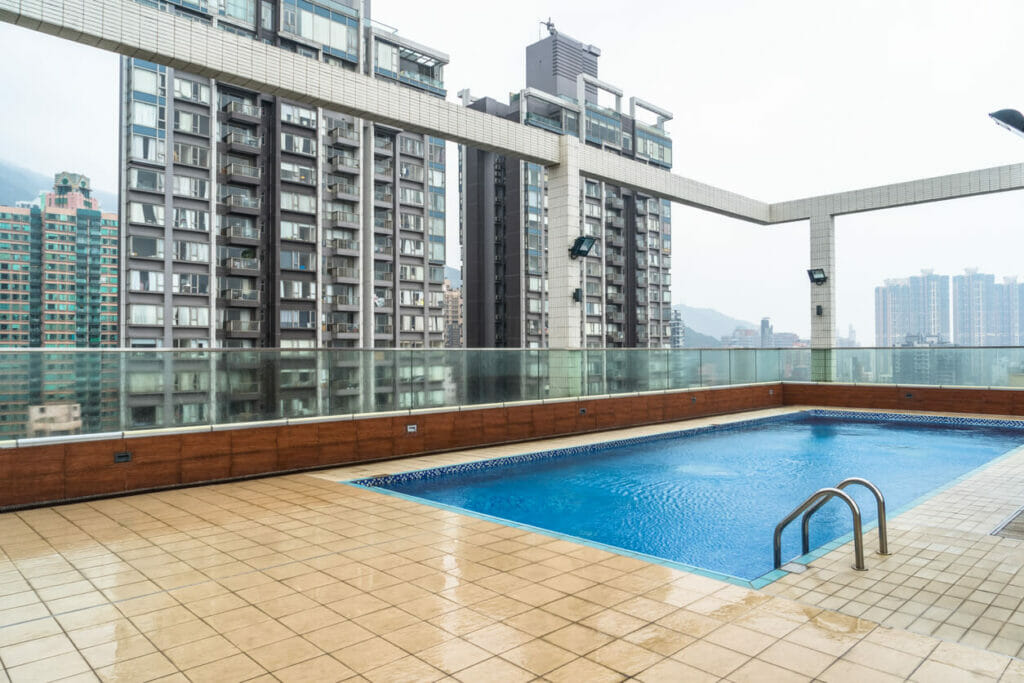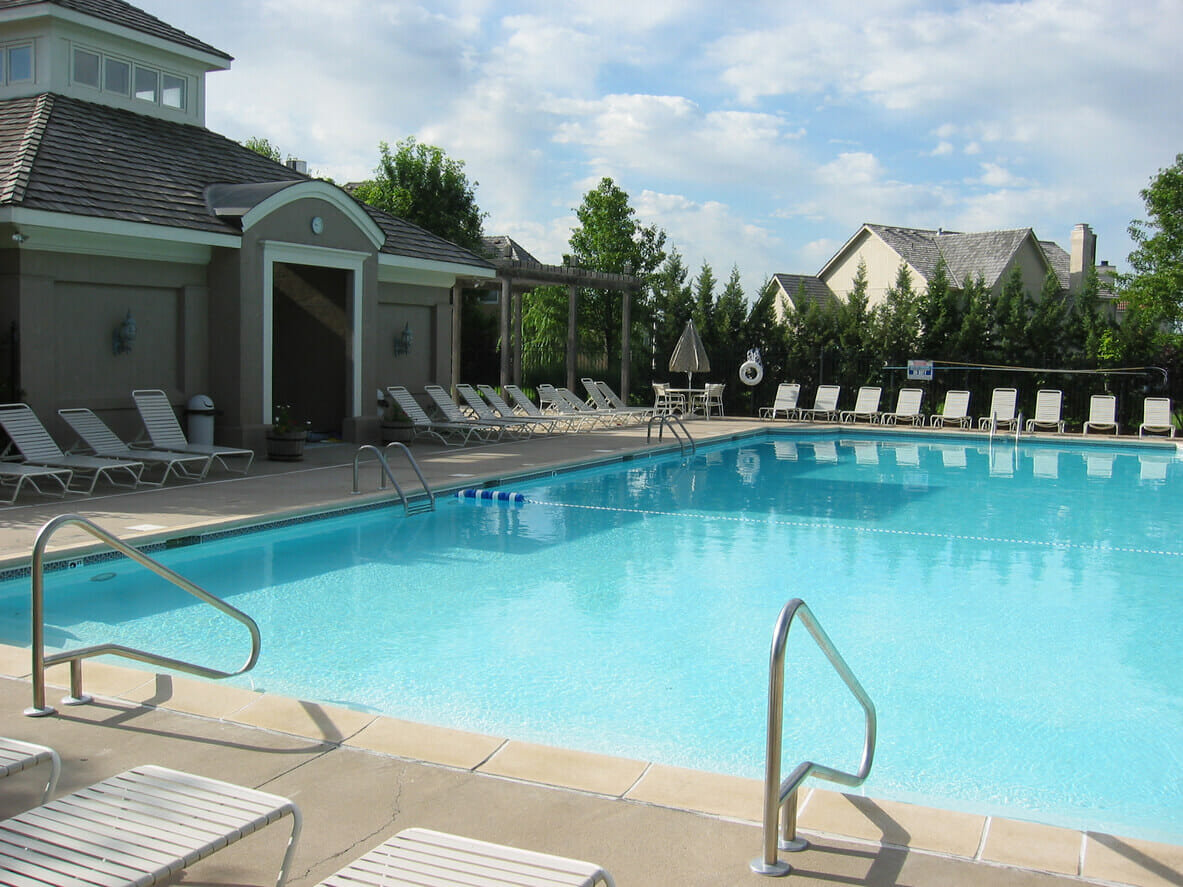Do you instantly feel a bit cooler when that first whiff of chlorine hits on a hot summer day? Condos and HOAs that are lucky enough to have semi-private pools cherish those hazy, humid weekends.
Not only can they find instant relief in the clear blue water, but they don’t have to take on any of the hard work that comes with maintaining an inground pool. Communities use fees paid by owners and hire professionals to care for and clean the prized amenity.
Table of contents
Nevertheless, sharing a pool with dozens (or perhaps hundreds) of other people comes with some challenges. Someone might have decided to invite 10 of their closest friends over for a pool party, while another person has carelessly left a glass bottle on the deck.
Disturbances and dangers create an unpleasant, and sometimes unsafe environment for others. Pool rules or policies help to ensure everyone has a safe and enjoyable experience around the pool. Feel free to download our free pool policy to see if your community has addressed the things that often create conflict between pool-goers.
Download our free pool policy template
Legislation
Before we get into condo/HOA pool policies, it’s important to note that your city may have to follow local laws governing pools.
For example, in Ontario, condo pools are considered public pools and are therefore regulated under the Health Protection and Promotion Act (HPPA) if the corporation has 6 or more units.
The corporation must designate a pool operator who must be trained in public pool operation and maintenance, filtration systems, water chemistry and all relevant safety and emergency procedures. The operator and corporation are responsible for several tasks, including:
- Maintaining appropriate water clarity and pH, and completing daily testing
- Ensuring all surfaces of the pool deck and walls are maintained in a sanitary condition and free from potential hazards
- Keeping records, including records of the number of bathers using the pool, the testing that has been completed, and any emergencies that have occurred. Records must be saved for at least 1 year
- Enforcing capacity limits for the pool and surrounding area. Limits are determined based on the size of the pool
- Providing appropriate signage and safety equipment
In California, the Legislature and Department of Health have similarly classified pools located within private HOAs and residential developments as “public.” As such:
- HOAs with 25 or more separate interests must test pool and spa water chemical composition and temperature on a daily basis, and keep a log of the testing
- At least one gate/door into the pool enclosure must allow for egress, without a key, for emergency purposes. If all gates/doors allow for keyless exit, no special signage is necessary. Otherwise, the keyless exits must have signage stating “EMERGENCY EXIT” in at least 4” high lettering
- A 12’ minimum length rescue pole and 17” minimum (exterior diameter) life ring with an attached throw rope, having a minimum of 3/16” diameter, must be available to people using the pool
It’s crucial for anyone responsible for pool management/maintenance to be familiar with local pool laws in order to avoid legal ramifications if there is ever an accident.
Lifeguards
It’s not uncommon for pools to have a “swim at your own risk” policy, especially if the community is not required to have a lifeguard on duty. Finding an affordable lifeguard isn’t exactly easy anymore; even big cities are struggling with shortages.
While condos/HOAs can save money by not hiring a certified lifeguard, they might encounter higher insurance costs. Staff will also be required to devote more time to monitoring the area and ensuring rules are being followed.
Some legal experts recommend distributing and collecting waivers from residents before granting them access to the pool.
Communities that aren’t required to do so may also consider delegating responsibility to the security team, or filling temporary “pool monitor” positions so that the pool area does have someone available to help if there is a problem.
A few managers have even organized a “pool safety day” to educate residents. Local fire and rescue personnel can come to the property to teach CPR and rescue skills, and help children understand why and how to safely use the pool.
Education
Condos and HOAs need to make sure their pool rules are comprehensive. They should address a variety of items from hours of operation to smoking on the deck to guests.
Rules must be reasonable, legal (more on that below), and enforceable. But residents must also be made aware of the rules in order for them to be of any use.
If your community is located in a city that experiences warm and cold seasons, then consider distributing pool rules every year, a couple of weeks before the pool opens. Rules can be shared via email, a resident/owner portal, posted on a community website, or distributed by hand. Make sure new or amended rules are bolded or stand out in some way.

If the pool is open all year round, make sure to send out a refresher at least twice a year through a newsletter or email. If possible, have the rules posted in the pool area.
In addition to the rules, make it clear what consequences pool users will face if they are caught breaking the rules. Enforcement is just as important as education. If there are no repercussions for going against the rules, then there is little incentive for members to follow them.
There have been situations where the community decides to shut down the pool completely for 2 or 3 days because too many residents were unwilling to follow the rules. While this will undoubtedly disappoint those who didn’t break the rules, it’s one of the most effective ways to correct inappropriate behavior.
Illegal pool rules
Did you know that communities can’t enforce rules that ban children from pools? Rules that discriminate against any person because of race, color, religion, sex, familial status, or national origin are not legally enforceable. The Fair Housing Act protects people from these types of rules. The Human Rights Act provides similar protection to people living in Canada.
Here are a few other examples of potentially discriminatory pool rules:
- No child under the age of 18 can use the pool without being accommodated by a caregiver who is at least 21
- Disabled persons must use the shallow end of the pool only
- Children are not permitted to use the pool during adult swim times
Communities may be able to have child-free swim periods if the community is for older residents (55+, for example), provided the community does not discriminate against any other protected class.
Residents who feel that pool rules are discriminatory may be able to sue the corporation or association.
If you are unsure about the enforceability of a rule, consult with your lawyer.
Conclusion
Pools are a lot of fun, but they are also a lot of work. Clear and detailed pool policies help to keep all residents safe and happy, as well as protect condos/HOAs.
Rules must also be routinely enforced as this is the best way to discourage others from misusing the shared facility.
Finally, don’t forget to apply sunscreen to protect yourself from burns. Be safe and have fun this summer!






















